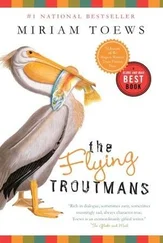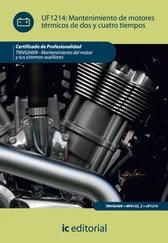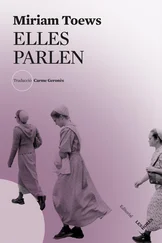Miriam Toews
A Complicated Kindness
Algren was Canada’s smallest town. It really was. Canada’s Smallest Town. It said so on a big old billboard right outside the town limits and Knute had checked with one of those government offices in the blue pages and they said fifteen hundred is what you need for a town. And that’s what Algren had. If it had one less it would be a village and if it had just one more it would be a bigger town. Like all the rest of the small towns. Being the smallest was its claim to fame.
Knute had come to Algren, from the city of Winnipeg, to look after her dad who’d had a heart attack. And to relieve her mom who said if she spent one more day in the house she’d go insane.
She was twenty-four years old. Her mother, Dory, had intended her name to be pronounced “Noot uh,” but nobody got it so it became just Knute, like “Noot.” Even her mom had given up on the “uh” part but did from time to time call her Knutie or sometimes, and she hated this, Knuter.
Knute had a daughter, Summer Feelin’, and Summer Feelin’ had a strange way of shaking when she was excited. She flapped her arms, and her fingers moved quickly as though she were typing to save her life, and sometimes her head went back and her mouth opened wide and sounds like aaah and uh-uh-uh came out of it.
When she first started doing it, Knute thought it was cute. Summer Feelin’ looked like she’d lift right off the ground. But then Knute started worrying about it and decided to take her to a specialist, a pediatric neurologist. He did a number of tests, including an encephalogram. Summer Feelin’ liked the wires and enjoyed the attention but told the doctor that flapping was just something she was born to do.
Eventually after all the results came in and the charts had been read and analyzed, he agreed with her. She was born to flap. There was no sign of strange electrical activity in her brain, no reason to do a CAT scan, and all accounts of her birth indicated no trauma had occurred, nothing untoward as she had made her way through Knute’s birth canal and into this world.
Every night Knute lay down with Summer Feelin’. That was the time S.F. told Knute stories and let her in on her big plans and Knute could feel her daughter’s body tremble with excitement. It quivered. It shook. It was out of her control. Knute would hold Summer Feelin’ until she stopped shaking, maybe a twitch or two or a shudder, and fell asleep. The specialist said S.F.’s condition, which wasn’t really a condition, was very rare but nothing to worry about. Then he’d added, in a thoughtful way, that the condition or lack of condition might be the precipitator to that rare phenomenon known as spontaneous combustion. So Knute worried, from time to time, about S.F. bursting into flames for no apparent reason. And that was the type of concern she couldn’t really explain to people, even close friends, without them asking her if she needed a nap or what she’d been reading lately or just plain laughing at her.
March was the month that Knute and Summer Feelin’ arrived in Algren. Tom had had a heart attack (or his heart attack, as Dory called it) in December. He’d been putting up the last decorations on the tree and BAM, it happened. He fell over, and because he was sort of clutching at the tree it fell on top of him. Ten days later, in the sterile intensive care ward of the hospital, nurses were still finding tiny pine needles in his hair and in the many creases of his skin. He picked up a nasty infection called septicemia in the hospital and, as a result, his lungs malfunctioned and he was put on a respirator. Of course, he couldn’t talk, but in his more lucid, pain-free moments he could write. Sort of. All he ever wrote, in a barely legible scrawl either stretched out over the whole page or sometimes scrunched up in the bottom corner, was “How is the tree?” Or “Is the tree okay?” Or “Is the tree up?” Or “I’m sorry about the tree.”
One day in the hospital Dory told him, “Tom, it’s Christmas Day today. Merry Christmas, sweetheart.”
His eyes were closed but he squeezed her hand. She said, “Do you remember Christmas, darling?”
And he opened his eyes and looked up at her and shook his head. Yet the next day, again, he wrote about the tree. He couldn’t remember Christmas, but he knew a tree should, for some reason, be erected in his living room.
Gradually he could remember a bit more and he could spell “world” backwards and count by sevens and all those things they’d asked him to do in the hospital when he was off the respirator and out of intensive care, but still he had a strange scattered memory, like, for instance, he knew he must, absolutely must , shave every morning, but he was unsure why. He reminded Dory to check the battery in the smoke detector, but when she said, “Oh, Tom, what’s the worst that can happen if our battery is dead for a day or two?” he didn’t have an answer. So he was caught in a bind where he was committed to doing what he’d always done but he couldn’t remember why he was doing it. His life, some might have said, had no purpose.
Neither did Knute’s, really. Summer Feelin’ was in a day care that she hated and Knute was working full time as a hostess in a busy downtown restaurant where everybody was used to seating themselves. She wasn’t aggressive enough to say, “Hey, can’t you read the sign? It says ‘wait to be seated,’” and so, pretty much, she just stood there all day smiling and feeling stupid. From time to time she moved the sign right in front of the door, but people would walk into it and then move it back out of their way. Sometimes the waitresses got mad at her because she wasn’t seating anybody in their sections or because everybody was sitting in their section and they were run off their feet trying to keep up with the orders. Then, for a while, Knute would try to keep people from walking past her and she’d say things like, “Please follow me,” or “A table will be ready in a minute,” or “How many of you are there?” Usually there would be two and when she asked how many of them there were, they’d look at each other like she was nuts, then they’d hold up two fingers or point at each other and say, “one, two,” in a loud voice.
“Two!” Knute would say, “okay, two, hmmm … two, you say,” like she was trying to figure out how to seat twelve. Then she’d meander around and around the restaurant with them behind her, suggesting possible tables, and she’d say, “Oh no, I think, well, no, well, yes, okay, sure, right here is fine. Wherever you want, really, I guess.”
Her boss’s wife and all the waitresses and the dishwasher and the two cooks kept telling him to fire her, but her boss kept giving her more chances. He told Knute she’d get the hang of it in a while, just get in their faces and make them wait. “They’re like pigs at the trough,” he said. “You gotta keep ’em under control.”
On her first day Knute had actually managed to lead an old couple to a table. But somehow they got their wires crossed, and Knute pulled a chair away from the table just as the man was going to sit on it. In slow motion he fell to the ground while Knute and his wife stared, horrified. As he fell, he knocked over the fake flower arrangement and the vase shattered.
Knute’s boss came running out and picked the old man up, cleaned up the glass and told them lunch was on the house. Then he took Knute into the kitchen, made her a salami sandwich on a bagel, sat her down on a lettuce crate and told her not to worry, not to worry, this was her first day, she’d work out the kinks. But she never did. Anyway, it was a lot better than pumping gas. The one time Knute tried that she accidentally filled up a motor home with gas — not the gas tank, but the interior of the motor home itself. She had stuck the nozzle into the water-spout hole instead of the gas tank hole. The woman driving the van hadn’t noticed until she lit up a cigarette and her motor home exploded, partially, and her leg ended up needing plastic surgery. Her husband sued the gas station and won a bunch of money, of course. Knute was let go and told, by her supervisor, that she should get tested for brain damage.
Читать дальше












